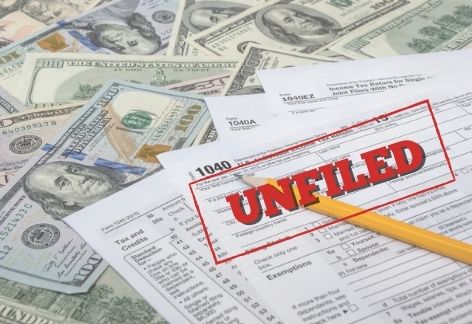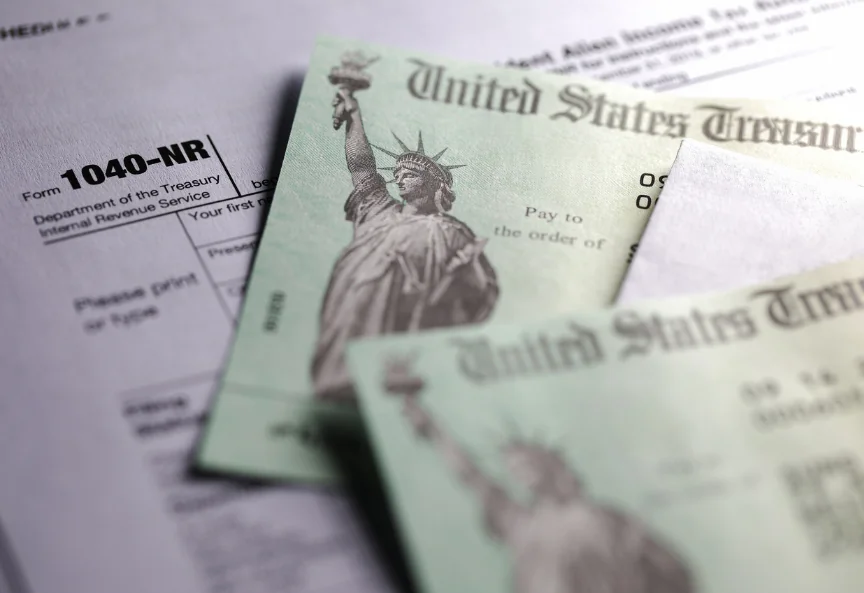If you have unfiled taxes, don't stress. There are steps you can take to get back into good standing with the IRS.
[lwptoc skipHeadingLevel="h3"]
One of the things the IRS cannot be criticized for is their memory – if you have unpaid taxes or unfiled taxes, the IRS will file your returns for you, and penalize you. Those penalties only stand to grow the longer you ignore your taxes, eventually leading to collection actions against you and your assets.
Thankfully, the IRS provides plenty of help for taxpayers looking to file their unfiled tax returns, tackle their debts, and get back in good standing with the government. If you have unfiled taxes, the last thing you should do is dally – but you shouldn’t panic, either. Let’s take a deep breath together and go through the process one step at a time.
The Basics on Back Tax Returns
The IRS takes taxes seriously – and attempts to avoid taxation through illegal means, even if it’s as simple as deliberately ignoring your duty as a taxpayer to file your taxes, it can mean hefty fines and even jail time.
If your tardiness was not out of maliciousness, but other reasons (getting caught up in financial trouble, a personal loss, sudden trauma, or simply forgetting it for that one year), the worst thing you’ll face is a higher tax bill. But waiting too long to act can turn that bill into a bank levy.
In general, outside of criminal intentions and subsequent jail time, the major consequences of forgetting to file your taxes include:
-
-
- Failure to file penalties
- Forfeited old tax refunds, and
- Dissolved current tax credit
-
Refundable tax credit is generally first used to pay off your existing liabilities to the IRS, and anything left over is sent out as a tax refund – forgetting to file your taxes will eat into your refund due to penalties and interest.
Furthermore, the IRS will file a substitute return for you based on your previous returns, as well as any W-2s and 1099 forms with information on your income. This can mean owing more in taxes than you really do due to the fact that the IRS does not take itemized deductions into account in a substitute return.
Once this substitute return is out, the IRS gives you a month’s notice before levying penalties and other consequences. During these 30 days, you must explain your tardiness and send in a completed tax return. In the months following your late filing, the IRS will send you multiple notices, including
Willfully ignoring these can be a fineable offense and may even lead to jail time.
Older unfiled taxes generally won’t let you waive your penalties – but they become necessary if you want to negotiate a payment plan for your tax debt. One of the prerequisites for getting back on the government’s good side is being up to date with your tax returns.
Talk to the IRS (and a Tax Attorney)
The first step to dealing with your unfiled taxes is to figure out where you currently stand with the IRS.
This means calling them and figuring out how what steps they’ve taken against you and your account:
-
-
- Who is assigned to your case?
- Have they filed a substitute return for you?
- Have they already begun a delinquent investigation?
-
Find out what information the IRS needs from you to avoid facing harsher consequences.
If you have gone multiple months, or even years without filing a tax return, your best bet may be to start by contacting a tax attorney. Rush Tax Resolution can help you get back on track with your taxes, and help you negotiate an amicable resolution with the IRS.
You will also need to talk to the IRS to retrieve all the information you might need to begin filing your back taxes. These include information returns relevant to the years missing a return. Alternatively, you can ask your employer for your respective W-2s and 1099s.
If you are self-employed, it is up to you to dig through your income statements and books to create an accurate return. Consider getting professional help to make sure your return is as thorough as possible, to avoid further scrutiny from the IRS.
If you’ve been late on filing your taxes for multiple years, then you should figure out just how far back you need to go to get into good standing with the IRS.
In general, the IRS can only demand returns from the last six years. In practice, you might only need to file your back returns for the last three. However, if you have somehow never filed a tax return, the IRS may require you to file one for every year that you were eligible for filing a return. In general, you must communicate with the IRS to figure out exactly what they want and need from you.
If you have questions regarding what returns you may or may not need to file to get back into good standing with the IRS, consider getting professional help from a tax advocate or attorney.
Prepare Your Unfiled Taxes and File Them Properly
Once you’re done preparing your returns, either by yourself or with the help of a qualified tax preparer, you can physically mail these to your local IRS field office and get in touch with them to keep an eye on your return processing.
The last thing you want is to go through all the effort of accurately preparing your returns and taking the steps needed to start dealing with your tax debt, only to find out that the returns never made it to the IRS.
Address Your Tax Balance
There are monthly failure-to-file and failure-to-pay penalties (each capping out at 25 percent of your original debt), as well as monthly interest (based on an annual rate). Depending on your total tax debt, the IRS may begin levying certain collection actions against you to protect their interest.
Addressing your outstanding balance from unfiled taxes as soon as possible is critical, as the IRS’s rates are typically less forgiving than your average credit, and letting your debt drag on can be massively detrimental to your ability to seek refinancing and loans, as well as do business. Eventually, the IRS will levy your assets and accounts, or even threaten jail time if you’re purposefully avoiding taxes.
Thankfully, first-time debtors to the IRS can work with a professional tax attorney to consider seeking IRS amnesty, or penalty relief due to Reasonable Cause. You will have to be completely open and transparent about your personal and financial situation in the last few years and prove that your circumstances massively hindered your ability to pay and file taxes.











